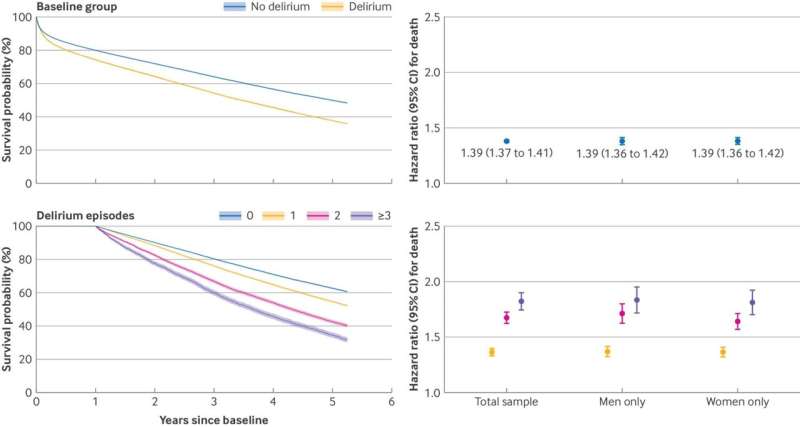This article has been reviewed according to Science X's editorial process and policies. Editors have highlighted the following attributes while ensuring the content's credibility:
fact-checked
peer-reviewed publication
trusted source
proofread
Patients with delirium more likely to develop dementia, finds study

University of Queensland researchers have found older patients who experience delirium are three times more likely to develop dementia. Professor Ruth Hubbard from UQ's Center for Health Services Research (CHSR) said the study also found that every episode of delirium increased the chance of developing dementia by 20%.
"Delirium is an acute confusional state which particularly impacts older people and can have long term detrimental effects on patients," Professor Hubbard said. "Our study found that it is also strongly linked to dementia."
The researchers analyzed a cohort of more than 110,000 patients from New South Wales hospitals over five years. The research paper was published in the British Medical Journal.
Lead author and CHSR research fellow, Dr. Emily Gordon, said more than 55,000 patients who had experienced delirium were compared to patients who had not.
"We paired the patients by matching certain criteria such as age, sex, frailty, reason for being in hospital, length of stay in hospital and length of stay in the intensive care unit," Dr. Gordon said.
"This was done to ensure we got as close as possible to isolating the impact of delirium on dementia risk, and to ignore the effects of other factors known to impact dementia, such as older age. We then followed both cohorts over five years to see whether they were eventually diagnosed with dementia."
Dr. Gordon said the findings highlighted the need for delirium prevention and care. "Up to 40% of delirium cases are preventable, and treatments are readily available. Measures to prevent delirium include keeping patients well nourished, hydrated and mobile.
"This study highlights the importance of delirium care and prevention—if we can reduce delirium, we may be able to reduce the global burden of dementia."
The data for this study was managed by research partners at the Australian Institute of Health Innovation at Macquarie University.
More information: Emily H Gordon et al, Delirium and incident dementia in hospital patients in New South Wales, Australia: retrospective cohort study, BMJ (2024). DOI: 10.1136/bmj-2023-077634




















